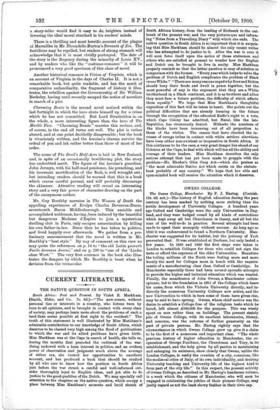C URRENT LITERAT ETRE.
THE NATIVE QUESTION IN SOUTH AFRICA.
South Africa: Past and Present. By Violet R. Markham. (Smith, Elder, and Co. 75. 6d.)—" The new-comer, without personal ties or interests in a country, who listens turn by turn to all opinions, and is brought in contact with every class of society, may perhaps learn more about the problems of such a land than seems possible at first sight to the resident." The truth of this statement is well illustrated by Miss Markham's admirable contribution to our knowledge of South Africa, which deserves to be classed very high among the flood of publications to which the war and its allied problems have given birth. Miss Markham was at the Cape in search of health, she tells us, during the months that preceded the outbreak of the war. Being endowed with a keen interest in politics, and an evident power of observation and judgment much above the average of either sex, she turned her opportunities to excellent account, and has produced a book that should be studied by all who care to know how the position in South Africa just before the war struck a candid and well-informed out- sider thoroughly loyal to English ideas, and yet able to do justice to the good qualities of the Dutch. We may specially call attention to the chapters on the native question, which occupy a place between Miss Markham's accurate and lucid sketch of
South African history, from the landing of Riebeeck to the out. break of the present war, and the very picturesque and inform. ing "Notes from a Travelling Diary" with which she ends. The native question in South Africa is so important that it is surpris- ing that Miss Markham should be almost the only recent writer who has attempted to do justice to it. After the war is over it will soon force itself upon the notice of those statesmen and others who are satisfied at present to wonder how the English and Dutch can be brought to live in amity. Miss Markham properly reminds us that the latter question is easy of solution in comparison with the former. "Every year which helps to solve the problem of Dutch and English complicates the problem of Black versus White." "There are many reasons urged why Boer and Briton should bury their feuds and dwell in peace together, but the most powerful of any is the argument that they are a White brotherhood in a Black continent, and it is as brothers and allies they must face a future problem, the difficulty of which affects them equally." We , hope that Miss Markham's thoughtful exposition of this fact will be taken to heart. She points out the political difficulties that are already looming in the future through the recognition of the educated Kaffir's right to a vote, which Cape Colony has admitted, but Natal, like the late Republics, has strenuously denied. Hitherto the numbers of the blacks have been increasing out of all proportion to those of the whites. The causes that have checked the in- crease of savage tribes in contact with white settlers elsewhere have been either non-existent or inoperative in South Africa. If this continues to be the case, a very great danger lies ahead of our Colonies at the Cape, to deal with which will tax all the ability and courage of their leaders. Miss Markham describes the only serious attempt that has yet been made to grapple with the problem—Mr. Rhodes's Glen Grey Act—which she praises as "the most admirable Native Act which exists on the statute- book probably of any country." We hope that her able and open-minded book will receive the attention which it deserves.






































 Previous page
Previous page